Alyssa Simone Wakefield
Posts tagged with Library Student Engagement Program in Blog Student Stories
Showing 1 - 10 of 21 items
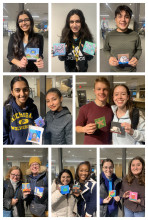
On Friday, November 21st, the library Student Ambassadors hosted a Sip and Paint in the third floor Shapiro Gallery!
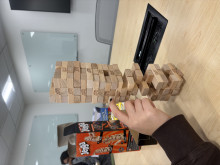
On Thursday, November 6th, the library student ambassadors hosted a spectacular Board Game Night on the 4th floor of the Shapiro Library!
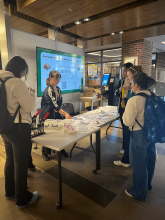
The Library Student Ambassadors hosted Pronoun Pin Day earlier this month in the Shapiro Lobby on Friday, October 10th, otherwise known as National Coming Out Day!
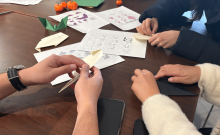
This Halloween, we went deep into the Hatcher Library stacks and the Hatcher Library lore with our Hatcher Haunts tours.
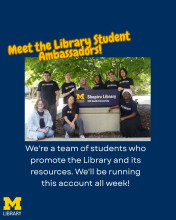
The Library Student Ambassadors hosted an “Instagram Takeover” of the @umichstudents Instagram account last week, sharing past and upcoming library events, what students can use the library for, as well as library resources students have access to.
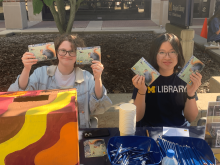
The library Student Ambassadors hosted the annual Postcard Writing event right outside the Shapiro Undergraduate Library on Friday, September 26th from 2-5 PM.
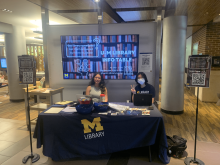
The Library Ambassadors held Info Tabling sessions for all students to learn more about the services the library has to offer.
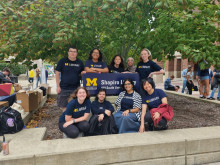
From events to social media outreach, the Student Library Engagement Ambassadors highlight underutilized library resources to the U-M community. Elizabeth and Amira, two recent graduates from the University of Michigan, recount the past year as experienced Ambassadors.
•
Chicana poet and cultural theorist Gloria Anzaldúa says: “Making anthologies is also activism. In the process of creating the composition, the work of art, you’re creating the culture. You’re rewriting the culture, which is very much an activist kind of thing.”
Similarly, I have curated this presentation as an anthology - from the composers and artists that I have commissioned and programmed, to the interviews, images, the words of Latina scholars, and parts of my own story. As a person of color, as a Latina, a chicana. I have learned that telling our stories is a form of activism. This is why in many ways, silencing us is also an act of violence.
I am curating this collaboration of new music by Latina composers to facilitate a public platform and to open a dialogue about Latina culture, identity, and experiences in higher education, specifically in the field of western classical music. This project enriches the art form by contributing a diverse collection of new works to the repertoire, addressing societal issues and promoting Latina artists in classical music.
Similarly, I have curated this presentation as an anthology - from the composers and artists that I have commissioned and programmed, to the interviews, images, the words of Latina scholars, and parts of my own story. As a person of color, as a Latina, a chicana. I have learned that telling our stories is a form of activism. This is why in many ways, silencing us is also an act of violence.
I am curating this collaboration of new music by Latina composers to facilitate a public platform and to open a dialogue about Latina culture, identity, and experiences in higher education, specifically in the field of western classical music. This project enriches the art form by contributing a diverse collection of new works to the repertoire, addressing societal issues and promoting Latina artists in classical music.

I am a 2022-2023 recipient of a University of Michigan Library Student Mini Grant. I am using the grant to support my mixed-methods dissertation, which aims to learn how we can improve rural student college access and connect rural high schoolers with postsecondary opportunities that align with their goals. Through a randomized controlled trial (RCT), I am testing how an informational intervention—providing rural seniors with information about a statewide free tuition program—affects their college-going behavior. I will contextualize these results with findings from focus groups with rural high school seniors about their knowledge of the program and their perspectives on the programs’ affordances and limitations.